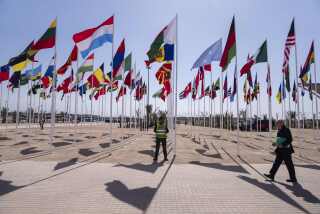Give IMF Resources to Seize Global Economic Opportunities
- Share via
At its annual conclave this week in Washington, the International Monetary Fund is seeking increased funding from its member governments. It is in the United States’ interest for the IMF to get the money and the strengthened mandate that it needs to meet three major economic challenges in the 1990s: the large trade imbalances among the industrial countries, the persistent Third World debt crisis and the opportunity to integrate the socialist nations into world markets.
The case for a multilateral approach to international monetary management rests on these fundamental truths: No country is a macroeconomic island, and no single government can dictate the course of global economic development.
Although the IMF cannot compel countries to alter their national economic policies to conform to the global welfare, as the voice of the international economic community it can and should bring objective analysis and moral pressure to bear on errant regimes. For this the IMF needs to play a greater role in the surveillance of key countries’ policies and in setting the benchmarks for macroeconomic coordination among them. For example, the IMF should help determine the exchange rates of the dollar, yen and deutsche mark, since they affect the fortunes of all nations.
In the Third World, heavy debt burdens are choking off growth, shrinking potential markets for U.S. exporters and threatening to undermine nascent democracies. Having embraced debt reduction, the proposals of Treasury Secretary Nicholas F. Brady are a significant conceptual advance. Nevertheless, negotiations between the commercial banks and many countries are now stalled. Brady’s first deal with Mexico failed to persuade either the creditor banks or the debtor nations that they stand to gain enough to offset the pain.
The IMF can breathe life into Brady’s promising idea by operating with the clear strategic objective of reducing each country’s debt service to a level consistent with sustainable growth. Once a nation’s financial requirements have been calculated, the fund should work with creditor governments to gain the compliance of the commercial banks. It also should increase its own lending to reform-minded debtors.
In Eastern Europe, the IMF could help ensure that Western capital flows to support market-oriented reforms. Most important, the IMF should begin to provide Soviet President Mikhail S. Gorbachev with the advice he will need to make perestroika work. The IMF is an obvious instrument for President Bush’s policy of seeking “the integration of the Soviet Union into the community of nations.”
The IMF’s managing director, Michel Camdessus, is seeking a 100% increase in financial resources. While the Bush Administration has not stated its position, it privately doubts the need for any new funds.
In our view, a 50% capital addition would enable the fund to perform its vital missions in the 1990s. An increase in resources from the current $110 billion to $165 billion would boost the fund’s clout in international economic negotiations and help to catalyze renewed growth in debtor nations. The increase also would permit the fund to make annual net disbursements to reform-minded governments of $6 billion annually over five years--up from an annual average of only $2.4 billion during the 1980s.
A $55-billion infusion would suffice for two reasons: The IMF is unlikely to actually use more money, since influential member countries fear that too much lending relieves pressure on borrowers to undertake overdue reforms; and the IMF’s projections of its internal liquidity needs are based on conservative assumptions that overstate its own reserve requirements.
For the United States, a modest 50% increase poses no real financial burden. The U.S. payment on its $12-billion share would be tallied as a budgetary wash, because the outlay is immediately offset by an equivalent increase in U.S. international reserves. However, to foster the kind of role the IMF should now play, the quota increase should be part of a policy package that includes three other elements.
Industrial-country governments should modify the framework of incentives facing the commercial banks to ensure their fair participation in reducing the debt burden of developing nations. Otherwise, increased IMF lending could result in an unacceptable transfer of risk to official agencies without an adequate improvement in the balance-of-payments and growth outlook of the developing countries.
In recognition of its economic power, Japan should be granted the No. 2 ranking in voting shares, behind only the United States. Washington should actively support this, and the affected European nations should gracefully acquiesce.
Finally, Congress should attach to the quota increase legislation a requirement that the U.S. Treasury work for a less secretive, more accessible, more accountable fund.
The times warrant a more transparent, dynamic and influential central monetary institution. That will require more resources for the IMF, changes in some of its policies, and a more disciplined approach to monetary matters on the part of all countries.
More to Read
Sign up for Essential California
The most important California stories and recommendations in your inbox every morning.
You may occasionally receive promotional content from the Los Angeles Times.












